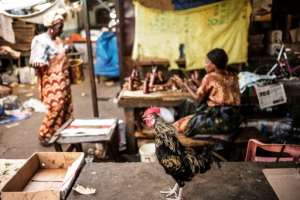
Banjul (Gambia) (AFP) - The cocktails keep flowing by the pool on the tourist strip, but in The Gambia's markets many African migrant traders are packing up their businesses and heading home.
The international community is piling pressure on President Yahya Jammeh to leave power after 22 years and hand over to opposition leader Adama Barrow, who won an election two weeks ago only for Jammeh to later reverse his original concession of defeat.
Of the economy's two main sources of investment from abroad, tourism appears to be weathering the country's political storm far better than the thousands of petty traders who move to The Gambia from the rest of west Africa.
President-elect Barrow told AFP on Monday claims that tourist numbers could be hit were "exaggerated", and with hotels and restaurants full, for the moment he appears to be right.
Flights from Brussels and London are still arriving like clockwork for the peak winter sun season, with many holidaymakers telling AFP they return to the country year after year -- and aren't changing their minds.
 Gambia's President-elect Adama Barrow says tourism will be little hit by the incumbent's rejection of election results
Gambia's President-elect Adama Barrow says tourism will be little hit by the incumbent's rejection of election results
"I did think there were more checkpoints," said Elly Preston, a returning retired schoolteacher spending three and a half months in Kololi, the Gambian heartland of full English breakfasts and karaoke bars stuffed with crooning pensioners.
Preston had seen alarming posts on the Tripadvisor tourism website, but with hotel prices as low as £40 a night (48 euros) she stuck with her instinct and left behind the cold and rain of Cleckheaton in northern England.
"I feel safe here. I know everybody and we come together," she said from her sunlounger, waving at a friend she met while on holiday here a few years ago.
Reading a thriller while taking in some rays in the late afternoon, Joseph Fowlis from Liverpool is well aware that Jammeh has refused to stand down, and supports Barrow's fight for change.
"Taxi drivers told me they want a democracy," he told AFP. "And why shouldn't they have one?"
But that hasn't affected his budget break. Apart from a higher than usual level of political conversation in the back of cabs, he said, little had changed from the previous years he has been here.
"If you didn't know about it you wouldn't think anything of it," he said.
Hotel owners are slightly more nervous, but as long as the tour operators keep the flights up, business will boom, they told AFP.
Trader panic
 A tourist looks from inside a bus at a supporter of the newly elected Gambian president Adama Barrow, celebrating in the streets of Senegambia, on December 2, 2016
A tourist looks from inside a bus at a supporter of the newly elected Gambian president Adama Barrow, celebrating in the streets of Senegambia, on December 2, 2016
The tiny west African state relies on largely British and Scandinavian tourists for 20 percent of its GDP.
Meanwhile Guineans, Mauritanians and Senegalese are well known for importing goods and selling them to the local population.
In a recent speech, Jammeh said 100,000 foreigners were working in The Gambia's markets, but did not specify a source for that figure.
Fifteen minutes down the road from Kololi, the hawkers and fruit sellers of Serekunda market have a very different interpretation of the events unfolding.
Amadou Wurri Jallow, a Guinean shopkeeper, spoke of his fear of soldiers being stationed on the streets of his neighbourhood.
"I do not understand why soldiers armed with machine guns would be deployed every night in built-up areas of Serekunda," Jallow said.
"This is really frightening and disturbing. I am leaving for my country until this political stalemate is resolved peacefully."
Fallou Diop, a Senegalese hawker who has lived and worked in The Gambia for the past few years, told AFP shortly before his departure to the city of Touba in central Senegal that the uncertainty was too much.
"Since no one can tell how this problem would come to an end, I am going back to Touba until the dust settles," he said.




 We’ll protect state wealth from opaque deals – Prof Jane Naana
We’ll protect state wealth from opaque deals – Prof Jane Naana
 Mauritania president says running for second term in June polls
Mauritania president says running for second term in June polls
 I won't ever say I was a mere driver’s mate' — Prof. Opoku-Agyemang
I won't ever say I was a mere driver’s mate' — Prof. Opoku-Agyemang
 2024 polls: 'EC struggling to defend credibility'— Prof. Opoku-Agyemang
2024 polls: 'EC struggling to defend credibility'— Prof. Opoku-Agyemang
 Akufo-Addo gov't's 'greed, unbridled arrogance, unrestrained impunity, sheer dis...
Akufo-Addo gov't's 'greed, unbridled arrogance, unrestrained impunity, sheer dis...
 Election 2024: Ghana needs an urgent reset, a leadership that is inspiring – Ma...
Election 2024: Ghana needs an urgent reset, a leadership that is inspiring – Ma...
 Partner NDC to rollout a future of limitless prospects – Prof Jane Naana Opoku-A...
Partner NDC to rollout a future of limitless prospects – Prof Jane Naana Opoku-A...
 NPP will remain in gov’t till Jesus comes — Diana Asamoah
NPP will remain in gov’t till Jesus comes — Diana Asamoah
 Sunyani Technical University demands apology from former SRC president over sex-...
Sunyani Technical University demands apology from former SRC president over sex-...
 'Dumsor' was resolved by Mahama but ‘incompetent' Akufo-Addo has destroyed the g...
'Dumsor' was resolved by Mahama but ‘incompetent' Akufo-Addo has destroyed the g...
